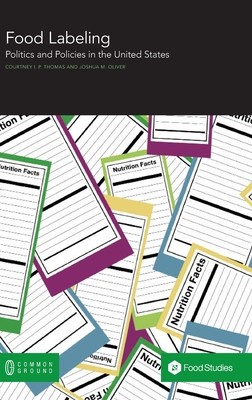
- We will send in 10–14 business days.
- Publisher: Common Ground Research Networks
- ISBN-10: 1863351906
- ISBN-13: 9781863351904
- Format: 15.6 x 23.4 x 1 cm, kieti viršeliai
- Language: English
- SAVE -10% with code: EXTRA
Food Labeling (e-book) (used book) | bookbook.eu
Reviews
Description
Consumers rely on food labels for all kinds of economic, ethical, and lifesaving information. What are the ingredients in this product? Does it conform to kosher or halal standards? Is it organic or free of genetically modified ingredients? Has it been ethically produced and traded? However, as essential as this information is to consumers, many people find themselves overwhelmed, confused, or misinformed by food labeling practices.
Authors examine the effectiveness of nutrition labels particularly for consumers with specific dietary needs and restrictions linked to health concerns. They analyze the history of the organic labeling movement and the future of this highly regulated and controversial term. They bring to life the legal battles that have emerged surrounding the labeling of genetically modified and bioengineered foods, and the interactions among federal agencies, state legislatures, Congress, and the judiciary. They scrutinize the future of fair trade certification, and the linkages among trade transparency, human rights, social justice, environmental sustainability, and economic security.
Authors examine the use of cage free, free-range, and pasture raised designations for chicken and egg production. They discuss the Fair Food label claim and the importance of consumer support in the success of boycotts and buycotts. Finally, they illuminate the cultural and economic intersection of food labeling and Islamophobia, demonstrating the ways in which food labels can become central in nationalist discourse. Each author's perspective emphasizes the importance of the food labeling policies that regulate this essential mechanism of communication in the food marketplace
EXTRA 10 % discount with code: EXTRA
The promotion ends in 22d.16:13:25
The discount code is valid when purchasing from 10 €. Discounts do not stack.
- Publisher: Common Ground Research Networks
- ISBN-10: 1863351906
- ISBN-13: 9781863351904
- Format: 15.6 x 23.4 x 1 cm, kieti viršeliai
- Language: English English
Consumers rely on food labels for all kinds of economic, ethical, and lifesaving information. What are the ingredients in this product? Does it conform to kosher or halal standards? Is it organic or free of genetically modified ingredients? Has it been ethically produced and traded? However, as essential as this information is to consumers, many people find themselves overwhelmed, confused, or misinformed by food labeling practices.
Authors examine the effectiveness of nutrition labels particularly for consumers with specific dietary needs and restrictions linked to health concerns. They analyze the history of the organic labeling movement and the future of this highly regulated and controversial term. They bring to life the legal battles that have emerged surrounding the labeling of genetically modified and bioengineered foods, and the interactions among federal agencies, state legislatures, Congress, and the judiciary. They scrutinize the future of fair trade certification, and the linkages among trade transparency, human rights, social justice, environmental sustainability, and economic security.
Authors examine the use of cage free, free-range, and pasture raised designations for chicken and egg production. They discuss the Fair Food label claim and the importance of consumer support in the success of boycotts and buycotts. Finally, they illuminate the cultural and economic intersection of food labeling and Islamophobia, demonstrating the ways in which food labels can become central in nationalist discourse. Each author's perspective emphasizes the importance of the food labeling policies that regulate this essential mechanism of communication in the food marketplace


Reviews